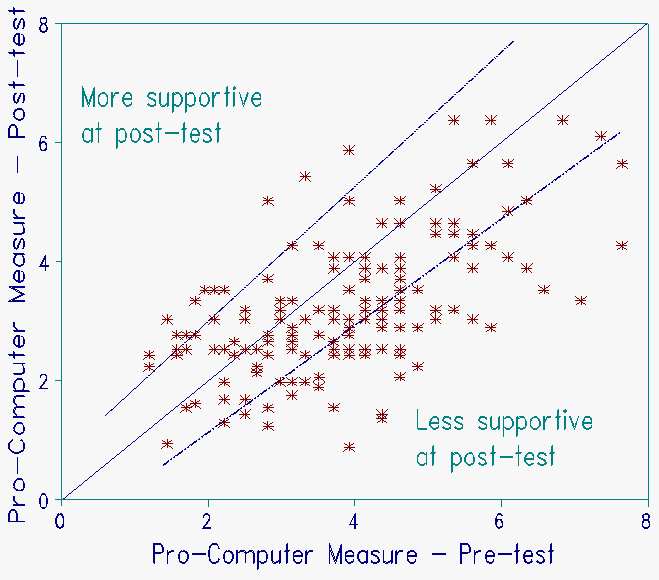
Will computers be to 21st Century education what blackboards were to the 19th Century? Computer technology promises to bring to the classroom a huge surge of personalized power: all the world's information at student fingertips, but presented with such graphical drama that the student can't help but learn and learn and learn...
Such is the dream. The reality, as perceived by elementary science teachers in training, is rather different. Boone & Gabel (1994) report a Rasch analysis of surveys administered to 160 student science teachers. Students were asked their view of the contribution that computers make to education. The 20 item survey was administered before and after pre-service training. Most respondents agreed that every college student should be computer-literate, and that, used properly, computers can improve the educational process. But they disagreed with the statements that "computers help raise student's test scores" and "computers will free teachers to give more individual attention to students."
Most surprising, however, was the discovery that student science teachers view computers less favorably after completing pre-service than before (see plot, a 95% confidence band is shown). Careful consideration of classroom realities may have warned these teachers-to-be that technological gimmicks are not the solution to educational problems. In its early days, television was advertized as the means by which the entire society would finally become educated. It is now realized that television is the primary means by which society is entertained and distracted away from education. These student-teachers' ambivalent attitude towards the computer's place in the classroom might merely be a pot-hole in the information highway. But it may also be an early warning that yet another rush into classroom technology is headed for a pile-up.
Boone WJ, Gabel D (1994) Computers and preservice elementary science teacher education. Journal of Computers in Math and Science Teaching 13(1), 17-42.

A Very Rasch prediction - correct so far!
Here is a report that confirms the findings of Boone & Gabel, "A U-turn on the Information Highway?", RMT 8:3, p.369, 1994.
Why Computers Have Not Saved The Classroom
What impact has computer technology had on public education in the US? That's the question journalist Todd Oppenheimer sets out to answer. His conclusion: Putting computers in classrooms has been almost entirely wasteful, and the rush to keep schools up-to-date with the latest technology has been largely pointless, reports Bob Blaisdell. "At this early stage of the personal computer's history, the technology is far too complex and error prone to be smoothly integrated into most classrooms," Oppenheimer writes. "While the technology business is creatively frantic, financially strapped public schools cannot afford to keep up with the innovations." Of course, this is not the first time US schools have been seduced by new technology, Oppenheimer points out. He summarizes the history of technological innovations in American schools and explains how each (TV among them) has been hailed as education's savior. Oppenheimer examines individual schools where technology has been useful, but there he largely credits the enthusiasm and devotion of individual teachers. The most effective teachers, he argues, are those who know enough to ignore the latest technological products and rely on such hands-on technology as pens and paper, musical instruments, wooden blocks, and rulers. These findings contrast sharply with education advocates who argue that education will become increasingly digital, mobile, and virtual.
Excerpted from:
Christian Science Monitor, Oct. 14, 2003
Reported in PEN Weekly NewsBlast, Oct. 17, 2003
RMT 18:4 Notes and Quotes … Rasch Measurement Transactions, 2005, 18:4 p. 9
A Very Rasch prediction - still correct!
Laptop losers: Tech actually hindering kids in classrooms
Published August 15, 2013
FoxNews.com
Laptops may actually hinder students ability to learn, providing a distraction and even affecting students sitting near their owners, according to a stunning new Canadian report.
With laptops and tablet computers pervading the modern classroom, the report suggests that paper and pencil might be less distracting overall.
"We really didn't think the effects would be this huge," explained McMaster University researcher Faria Sana, who co-authored the study with fellow doctoral student Tina Weston. "It can change your grade from a B+ to a B-."
Laptop multitasking hinders classroom learning for both users and nearby peers. Faria Sana, Tina Weston, Nicholas J. Cepeda. Computers & Education (2013) 24-31.
U-turn on the information highway. Boone WJ, Gabel D. … Rasch Measurement Transactions, 1994, 8:3 p.369
| Forum | Rasch Measurement Forum to discuss any Rasch-related topic |
Go to Top of Page
Go to index of all Rasch Measurement Transactions
AERA members: Join the Rasch Measurement SIG and receive the printed version of RMT
Some back issues of RMT are available as bound volumes
Subscribe to Journal of Applied Measurement
Go to Institute for Objective Measurement Home Page. The Rasch Measurement SIG (AERA) thanks the Institute for Objective Measurement for inviting the publication of Rasch Measurement Transactions on the Institute's website, www.rasch.org.
| Coming Rasch-related Events | |
|---|---|
| Jan. 16 - Feb. 13, 2025, Fri.-Fri. | On-line workshop: Rasch Measurement - Core Topics (E. Smith, Winsteps), www.statistics.com |
| Apr. 8 - Apr. 11, 2026, Wed.-Sat. | National Council for Measurement in Education - Los Angeles, CA, ncme.org/events/2026-annual-meeting |
| Apr. 8 - Apr. 12, 2026, Wed.-Sun. | American Educational Research Association - Los Angeles, CA, www.aera.net/AERA2026 |
| May. 15 - June 12, 2026, Fri.-Fri. | On-line workshop: Rasch Measurement - Core Topics (E. Smith, Winsteps), www.statistics.com |
| June 19 - July 25, 2026, Fri.-Sat. | On-line workshop: Rasch Measurement - Further Topics (E. Smith, Winsteps), www.statistics.com |
The URL of this page is www.rasch.org/rmt/rmt83a.htm
Website: www.rasch.org/rmt/contents.htm